|
Follow us
 
|
 |
| Scholarly Resources |
|
|
| |
|
|
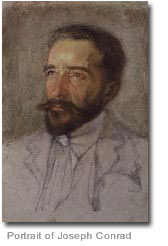 |
Matter Introductory
For the scholar and the advanced student the major print resources on Conrad's creative work and life are covered in "Further Reading" in The Cambridge Companion to Joseph Conrad, ed. J. H. Stape (Cambridge University Press, 1996). The Oxford Reader's Companion to Joseph Conrad by Owen Knowles and Gene M. Moore (Oxford University Press, 2000) supplements and brings closer to date the works Stape notes.
An essential guide to criticism to 1990 is to be found in Owen Knowles, An Annotated Critical Bibliography of Joseph Conrad (Harvester Wheatsheaf, 1990). After that date, the researcher must rely on the Annual Bibliography compiled by the Modern Language Association of America and The Year's Work in English Studies, the latter evaluative.
The scholarly resources noted here focus on those available on the World Wide Web. Over the past five years in particular these have dramatically altered certain kinds of historical, bibliographical, and biographical searches. Literary criticism is not as well served, much publishing of critical articles still occurring in print or accessible in digital form only through subscription services and mainly accessed through university libraries or other major libraries. (Access to these resources through the British Library is on-site only.)
|
|
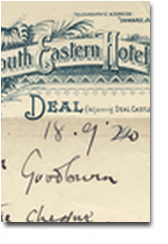 |
Bibliographical Resources
For a list of works devoted to Conrad's life and works, see A Bibliography of Books, Pamphlets, and Broadsides about Joseph Conrad, compiled by John G. Peters, University of North Texas.
Much of the Conrad canon is available online (see Links); however, the accuracy and reliability of these texts is often questionable, and the scholar cannot often be assured of the edition used. Useful for searching words or phrases, these tend to have more limited appeal for serious textual purposes.
Various works by Conrad (including some volumes of the Heinemann Collected Edition), as well as early works of criticism (Curle's 1914 study) and selected other sources, including Garnett's edition of letters to Conrad, are available at the Internet Archive, whose usefulness belies its appearance. Also available through the site are several first editions and Notes on My Books. Various first editions are also available at the Open Library and GoogleBooks.
All volumes of Heinemann's Collected Edition (1920-21, 1926-27) are available as PDFs on the website of the Bodleian Library, Oxford. The call number is 256 d.307: The Works of Joseph Conrad.
Volumes 1-3 of the Catalogue of the Library of John Quinn (1923) is available in digital form at Hathi Trust.
In July 2013 and July 2014 the late Stanley Seeger’s Joseph Conrad Collection was auctioned by Sotheby’s. Thanks to the generosity of Sotheby’s, the two auction catalogues are available here: LINK.
Stephen Donovan's project puts all the original serial publications online at Conrad First: The Joseph Conrad Periodical Archive, an invaluable resource supported in part by The Joseph Conrad Society (UK).
A useful complement to these are the full volumes of The English Review at the Modernist Journals Project.
Gene M. Moore's A Descriptive Location Register of Joseph Conrad's Literary Manuscripts (updated June 2021 version) is available here for download. The original print version (Autumn 2002, 27.2) may be ordered as a back issue of The Conradian (see Publications page for details).
The major Conrad libraries are listed on the Links page of this website. Conrad's main French sources and materials in French related to his experience in the French-speaking world and in Africa can be accessed at the Bibliotheque Nationale's website: Gallica.
Textual scholars may find of interest The Virtual Typewriter Museum, which helps in identifying the various typewriters used by Conrad's amanuenses, and the "Tuan Jim" manuscript, the origin of Lord Jim. Thomas J. Wise's Bibliography of Conrad may also be of interest.
The Beinecke Rare Book and Manuscript Library at Yale University, in addition to its rich collection of Conrad photographs, has put online the whole of 'Heart of Darkness' and The Shadow-Line, as well as several short stories collected in Tales of Unrest.
Conrad's reading may be canvassed by a search on the UK Reading Experience Database.
The Harry Ransom Center, University of Texas at Austin, offers online access to Conradiana, including the Victory MS and the Chance TS.
|
|
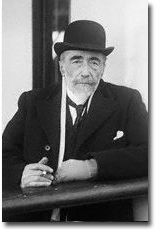 |
Biographical Resources
Various genealogical resources, most involving payment, allow establishing facts about the life of Conrad, his family, and members of his circle. Particularly useful are Ancestry.com and FindMy Past .com, both paid services either by subscription or on a per use basis, making available the Censuses of England and Wales since 1840 and the records of Birth, Marriage, and Death of the Registrar General. Available without charge is FreeBMD, which covers much of the same territory, but has less subtle search engines and provides information.
Also of interest is the free Family Search site offering data of various kinds (UK Census 1881, US Social Security Death Index, International Genealogical Index).
|
|
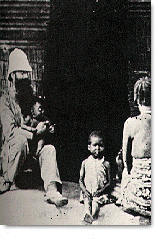 |
Historical Resources
Invaluable for tracing the movements of Conrad's friends and business contacts on trips across the Atlantic is The Ellis Island Site, which logs passenger arrivals (including Conrad's own arrival in the Tuscania in 1923) in New York from about 1890 to 1925. Some passenger manifests also include personal details such as address, profession, date of birth, and height and eye colour.
Invaluable, though deliberately limited to selected periods, are the series of historical directories for England and Wales available through the Historical Directories Project, based at the University of Leicester. Although the search engine is clumsy, this material previously available only at Guildhall, the British Library, and some local libraries offers a wealth of information for tracing references to individuals mentioned in Conrad's correspondence or for figures who provided the basis for fictional characters.
Conrad's London may be vividly conjured up by the superbly detailed maps and sometimes colourful reports of the Charles Booth Online Archive, maintained by the London School of Economics. Several other historical maps of London, can be accessed at Maps of London, and period photographs, mainly early twentieth century but some late Victorian, of the city and, despite its name, of places throughout England, are available at Images of London.
Historical maps of Africa, Asia, and Europe can be accessed at The Perry Castañeda Map Library, University of Texas and historical maps of Ukraine at Maps of the Ukraine (less useful than they might be because the Polish names, contrary to what is purported, do not use Polish letters).
For exploring Conrad's sources for his South-east Asian fictions a wide variety of nineteenth-century texts, including Wallace's Malay Archipelago, is to be found on Cornell's superb South-east Asian Visions site, a treasure-trove of travel narratives and ethnographies.
The value of money during Conrad's writing career relative to today's values may be calculated by Measuring Worth, which gives values for both British and US currencies.
The London Times, Times Literary Supplement, and The New York Times have been digitalized and are available through university libraries. The last offers public access to its Archives on payment of a per-view fee. The Library of Congress website Chronicling America offers, with free access, a valuable archive of American newspapers from 1860–1922.
The Gazette official journal of record for the UK, available without cost.
Available free online and with materials relevant for Conrad's experience in the Far East and Australia are Singapore Pages/ NewspaperSG and Australian Newspapers. Conrad's period in Geneva is covered by Journal de Gènève (French search capabilities only).
|
|
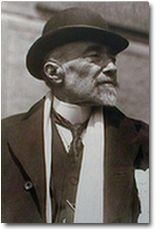 |
General Resources
The researcher who has not already bookmarked the The King James Bible will find a fully searchable and easy-to-use resource managed by the University of Virginia. The Book of Common Prayer is also useful for tracing Conrad's allusions. A collection of historical French dictionaries may be useful in exploring Conrad's French and French contexts.
A handy perpetual calendar for the 19th and 20th centuries is available as is Bartlett's Familiar Quotations. Hobson-Jobson is the standard source for colonial terms. A useful tool for converting imperial to metric measurement can be accessed here.
Several works by and about Conrad are to be found on The HathiTrust Digital Library.
|
|
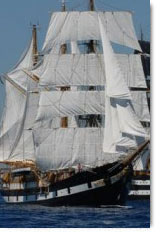 |
Maritime Resources
Sources related to Conrad's maritime career are of varying usefulness. His experience in Sydney and that of his friend G. F. W. Hope are covered by Mariners and Ships in Australian Waters. No South African records survive at Capetown and details of arrival and departure, apart from newspaper sources, are lost.
Information on selected ships is available at Palmer's List of Merchant Vessels, The Ship Index, and on shipping generally at The Maritime History Virtual Archives.
Also of interest is the Lloyd's Captains' Registers, and the useful (but very incomplete) List of British Ships and Crews of the Crew List Index Project (CLIP) held in various archives.
Alston Kennerley's exhaustive study of Conrad's shipmates appears in his "Conrad's Shipmates in British Ships," The Conradian 37.1 (2012): 59-79.
The following tables and documentation (in .pdf format) are essential supporting elements of this study:
The following supplementary documentation lists the names of Conrad's shipmates in British vessels and relates to his service in the Otago:
|
|
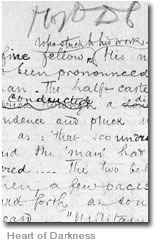 |
The Hans van Marle Collection of Conradiana
The archives of the eminent Dutch Conradian Hans van Marle (1922–2001) containing his correspondence, papers, photographs, and books, have been catalogued and acquired by Senate House Library, University of London.
The Conradian published a selection from these papers, edited by Gene M. Moore, who has catalogued them as a project of the Joseph Conrad Society (UK).
A detailed catalogue / finder’s aid is available in pdf here: Hans van Marle Collection. (If the page does not appear immediately, enter "van marle" on the search screen).
Miscellaneous
- Images and a note, by John Burland, on the camphor wood chest owned by Captain Joseph Lucas Clark, master of the SS Jeddah, may be accessed here
- A transcription (pdf. file) of Marguerite Poradowska's translation into French of Conrad's "An Outpost of Progress." For a discussion, see Anne Arnold, "Marguerite Poradowska as a Translator of Conrad," The Conradian 33.1 (2008): 119-29.
|
|
|
|

